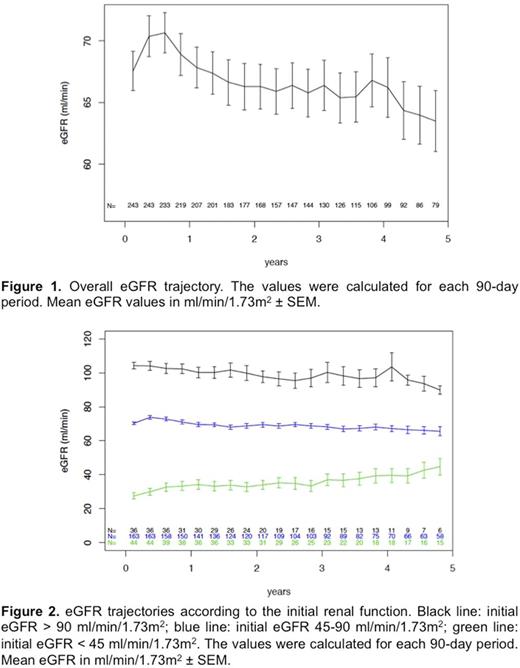Abstract
Background: Renal impairment (RI) is frequent in patients with Multiple Myeloma (MM), yet no substantial data exist on the long-term course of renal function throughout the disease. Further, it remains unknown whether factors determinable at diagnosis might predict the course of renal function in MM.
Methods: Estimated glomerular filtration rate (eGFR) values (n=22,457) were used to create renal function trajectories in 243 newly diagnosed MM patients throughout a 5-year observation period. For each 90-day interval, the eGFR mean was calculated as the area under the eGRF curve. Baseline epidemiological and laboratory factors were used for stratified analysis.
Results: The cohort exhibited a mean eGFR of 61.9±24.5 ml/min/1.73m2 at diagnosis; 40.2% had an eGFR below 60 ml/min/1.73m2. An initial overall increase of 2.81±8.97 ml/min/1.73m2 within the first 90-day period was observed (Figure 1). Thereafter, a steady overall eGFR decline (mean change -0.19±6.57 ml/min/1.73m2 per period) was observed, resulting in a net mean decrease of 3.58 ml/min/1.73m2 after 5 years. Patients with an eGFR below 45 ml/min/1.73m2 at diagnosis tended to improve most throughout the observation period (+15.15 ml/min/1.73m2; Figure 2). While a lower eGFR at diagnosis was associated with higher age and lower hemoglobin, these factors as well as the percentage of bone marrow plasma cell infiltration and total serum protein were not predictive of renal function. This also applied for the specific sub-type of paraprotein.
Conclusions: Renal impairment is extraordinarily frequent in MM patients both at diagnosis and throughout the disease course. In the presented cohort, kidney function followed a non-linear course; after an initial amelioration in most patients, a continuous decline of eGFR was observed. Established surrogate parameters for negative outcome did not serve as predictive markers for the course of renal function in this cohort.However, patients with the lowest initial eGFR and highest MM disease burden exhibited a strong potential for renal improvement.
Gisslinger: AOP Orphan Pharmaceuticals AG: Consultancy, Honoraria; Takeda: Honoraria; Novartis: Consultancy, Honoraria; PharmaEssentia: Consultancy, Honoraria; Shire: Honoraria; Janssen Cilag: Honoraria. Krauth: Janssen Cilag: Honoraria; Novartis: Honoraria; Celgene: Honoraria; BMS: Honoraria; Takeda: Honoraria; Amgen: Honoraria; AOP Orphan Pharmaceuticals AG: Honoraria.
Author notes
Asterisk with author names denotes non-ASH members.


This feature is available to Subscribers Only
Sign In or Create an Account Close Modal